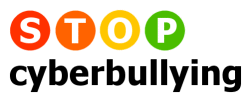 |
what is it? :: how it works :: why cyberbully? :: prevention :: take action :: what's the law?
![]() In this section:
In this section:
Offsite Internet activities and schools :: What methods work with the different kinds of cyberbullies? :: Instant Messaging 101 :: Parry Aftab’s guide for schools on cyberbullying :: Community programs :: Wired Kids Summits :: Wired Kids Summits: Cyberbullying - Youth-Empowered Solutions :: Internet Superheroes :: Teenangels
What methods work with the different kinds of cyberbullies?
The four types of cyberbullies include:
- The Vengeful Angel
- The Power-Hungry or Revenge of the Nerds
- The “Mean Girls”
- The Inadvertent Cyberbully or “Because I Can”
Some methods of cyberbullying are unique to a certain kinds of cyberbullies. And so are the ways the cyberbully maintain their secrecy or broadcast their actions to others. Some are secretive, some require an audience and some are entirely inadvertent.
Because the motives differ from each type of cyberbully, the solutions need to address their special issues. There is no “one size fits all” when cyberbullying is concerned. But understanding more about why they cyberbully others will help. You have to address the motives. That’s why awareness campaigns need several different messages to address the problem.
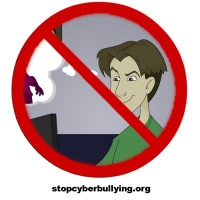 “The Vengeful Angel”
“The Vengeful Angel”
In this type of cyberbullying, the cyberbully doesn’t see themselves as a bully at all. They see themselves as righting wrongs, or protecting themselves or others from the “bad guy” they are now victimizing. This includes situations when the victim of cyberbullying or offline bullying retaliates and becomes a cyberbully themselves They may be angry at something the victim did and feel they are taking warranted revenge or teaching the other a lesson. The “Vengeful Angel” cyberbully often gets involved trying to protect a friend who is being bullied or cyberbullied. They generally work alone, but may share their activities and motives with their close friends and others they perceive as being victimized by the person they are cyberbullying.
Vengeful Angels need to know that no one should try and take justice into their own hands. They need to understand that few things are clear enough to understand, and that fighting bullying with more bullying only makes things worse. They need to see themselves as bullies, not the do-gooder they think they are. It also helps to address the reasons they lashed out in the first place. If they sense injustices, maybe there really are injustices. Instead of just blaming the Vengeful Angel, solutions here also require that the situation be reviewed to see what can be done to address the underlying problem. S there a place to report bullying or cyberbullying? Can that be done anonymously? Is there a peer counseling group that handles these matters? What about parents and school administrators. Do they ignore bullying when it occurs, or do they take it seriously? The more methods we can give these kinds of cyberbullies to use official channels to right wrongs, the less often they will try to take justice into their own hands.
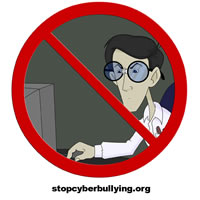 The “Power-Hungry” and “Revenge of the Nerds”
The “Power-Hungry” and “Revenge of the Nerds”
Just as their schoolyard counterparts, some cyberbullies want to exert their authority, show that they are powerful enough to make others do what they want and some want to control others with fear. Sometimes the kids want to hurt another kid. Sometimes they just don’t like the other kid. These are no different than the offline tough schoolyard bullies, except for their method. Power-Hungry” cyberbullies usually need an audience. It may be a small audience of their friends or those within their circle at school. Often the power they feel when only cyberbullying someone is not enough to feed their need to be seen as powerful and intimidating. They often brag about their actions. They want a reaction, and without one may escalate their activities to get one.
Interestingly enough, though, the “Power-Hungry” cyberbully is often the victim of typical offline bullying. They may be female, or physically smaller, the ones picked on for not being popular enough, or cool enough. They may have greater technical skills. Some people call this the “Revenge of the Nerds” cyberbullying. It is their intention to frighten or embarrass their victims. And they are empowered by the anonymity of the Internet and digital communications and the fact that they never have to confront their victim. They may act tough online, but are not tough in real life. They are often not a bullying but “just playing one on TV.”
Revenge of the Nerds cyberbullies usually target their victims one-on-one and the cyberbully often keeps their activities secret from their friends. If they share their actions, they are doing it only with others they feel would be sympathetic. The rarely appreciate the seriousness of their actions. They also often resort to cyberbullying-by-proxy. Because of this and their tech skills, they can be the most dangerous of all cyberbullies.
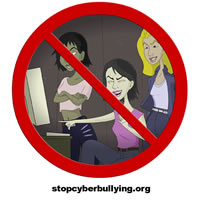 “Mean Girls”
“Mean Girls”
The last type of cyberbullying occurs when the cyberbully is bored or looking for entertainment. It is largely ego-based and the most immature of all cyberbullying types. Typically, in the “Mean Girls” bullying situations, the cyberbullies are female. They may be bullying other girls (most frequently) or boys (less frequently).
“Mean Girls” cyberbullying is usually done, or at least planned, in a group, either virtually or together in one room. This kind of cyberbullying is done for entertainment. It may occur from a school library or a slumber party, or from the family room of someone after school. This kind of cyberbullying requires an audience. The cyberbullies in a “mean girls” situation want others to know who they are and that they have the power to cyberbully others. This kind of cyberbullying grows when fed by group admiration, cliques or by the silence of others who stand by and let it happen. It quickly dies if they don’t get the entertainment value they are seeking.
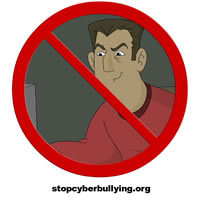 The Inadvertent Cyberbully
The Inadvertent Cyberbully
Inadvertent cyberbullies usually don’t think they are cyberbullies at all. They may be pretending to be tough online, or role playing, or they may be reacting to hateful or provocative messages they have received. Unlike the Revenge of the Nerds cyberbullies, they don’t lash out intentionally. They just respond without thinking about the consequences of their actions.
They may feel hurt, or angry because of a communication sent to them, or something they have seen online. And they tend to respond in anger or frustration. They don’t think before clicking “send.”
Sometimes, while experimenting in role-playing online, they may send cyberbullying communications or target someone without understanding how serious this could be. They do it for the heck of it “Because I Can.” They do it for the fun of it. They may also do it to one of their friends, joking around. But their friend may not recognize that it is another friend or make take it seriously. They tend to do this when alone, and are mostly surprised when someone accuses them of cyberabuse.
![]()







contact us :: volunteer :: media
privacy policy :: terms of use